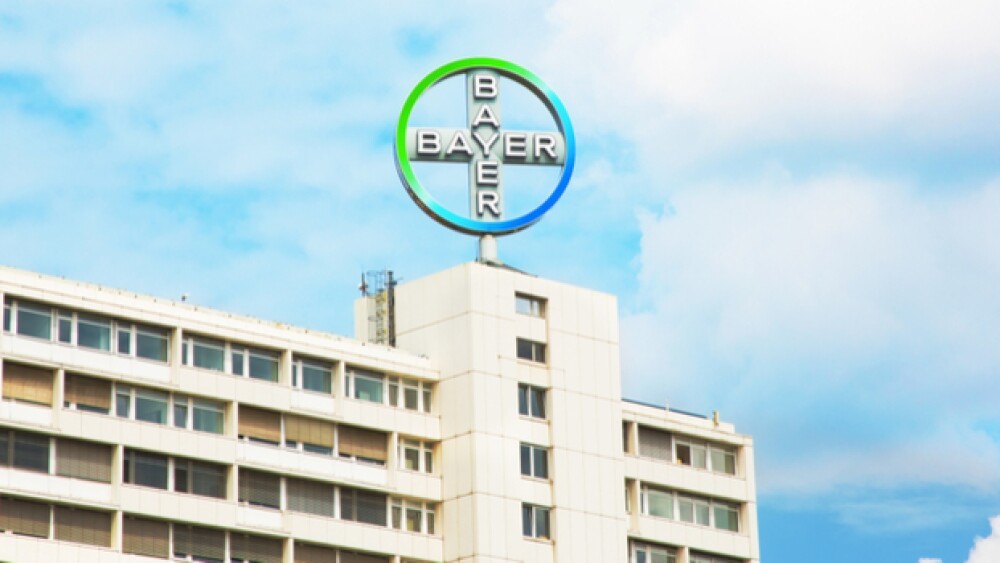At the same time that Bayer AG announced it was planning to eliminate about 4,500 jobs in Germany, it is adding about 150 jobs over the next three years in Massachusetts.
LUMIKK555 / Shutterstock.com
At the same time that Bayer announced it was planning to eliminate about 4,500 jobs in Germany, it is adding about 150 jobs over the next three years in Massachusetts. The company has indicated it plans to cut about 12,000 jobs globally, or about 10% of its workforce. This is, in part, to increase profitability after it acquired St. Louis-based Monsanto for $63 billion.
Bayer currently employs 20 people in Cambridge, Mass. The new staffers will work in a 12-story structure that the Massachusetts Institute of Technology (MIT) began building on Main Street. They will focus on developing oncology therapeutics.
Bayer signed a lease for 62,100 square feet on the top two floors of the building as well as a common area. The lease runs for 12 years and came to a total of $100 million. According to Bayer executives, with the additional expense of building laboratories and staff wages and benefits, the company is spending about $200 million.
At least some of Bayer’s job cuts and the Monsanto acquisition are related to the more than 11,200 lawsuits in the U.S. the company is facing over the main ingredient in Monsanto’s Roundup weed killer, glyphosate. In August 2018, the newly merged companies lost a lawsuit in California to former school groundskeeper, Dewayne Johnson, who alleged that exposure to Roundup and Ranger Pro weed killers caused his non-Hodgkin’s lymphoma. The jury awarded him $289 million. Bayer also lost another similar case.
Bayer denies any link to cancer and has vowed to appeal both cases.
Alistair Campbell, an analyst with Bernberg, projects that resolving these lawsuits will cost Bayer about $5 billion, based on past product liability settlements. These include Merck & Co.’s $4.9 billion settlement over Vioxx, a painkiller, and Bayer’s settlement over Baycol, for cholesterol. In that case, Bayer paid $4.2 billion in total settlement costs.
The Bayer cuts in Germany make up about 14% of the company’s Germany workforce. Approximately 3,000 are jobs in information technology and administration, including some cuts in the agriculture unit related to the Monsanto acquisition.
The total cuts are expected to be made by the end of 2021. About 4,100 of the job cuts globally will be in the agriculture unit, about 1,100 in its consumer health division, and about 900 in R&D. About 350 layoffs are associated with the closure of a German manufacturing plant that made a treatment for hemophilia.
The Cambridge, Mass. expansion is part of the company’s strategy to move more of its R&D outside of Germany, according to Joerg Moeller, Executive Vice President and Head of Global Research and Development for Bayer. “I was first in Boston in ’89, and at that time, Cambridge looked very different,” Moeller told The Boston Globe. “If you look at it now, it is basically, in my view, together with the San Francisco area, probably [one of] the two preeminent innovation hot spots on this planet.”
Bayer’s new Cambridge project is planned to open in 2021 with 75 employees and double a year later. Half the staff will be researchers working to develop targeted cancer therapies, the rest will be a variety, including data scientists. About 95% of the hires are expected to come from the Boston area.
Three years ago, Bayer launched its East Coast Innovation Center in Cambridge, which has 10 employees. In June 2018, it invested $22 million to start a “precision cardiology laboratory” at the Broad Institute of MIT and Harvard. Ten of the 20 researchers in that lab work for Bayer.





